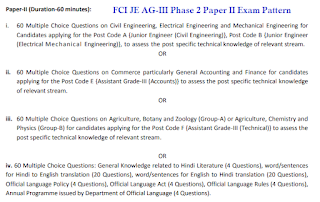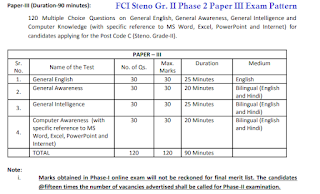So as far as the competition is concerned, it is going to be very high. Candidates who want to be placed and get selected, should prepare better in order to have higher chances of qualifying the examination. Here we are providing the latest syllabus to help them perform better. Read the information given here.
FCI Syllabus 2024 with Exam pattern for JE, AG-III Steno posts
|
Sr. No. |
Test Name |
No. of Questions |
Max. Marks |
Duration (minutes) |
Language |
|
1 |
English Language |
25 |
25 |
15 |
English |
|
2 |
Reasoning Ability |
25 |
25 |
15 |
Hindi & English |
|
3 |
Numerical Aptitude |
25 |
25 |
15 |
Hindi & English |
|
4 |
General Studies* comprising of Geography, Economy, General upto Class 8th level. (20 Current Affairs (5 Questions)
|
25 |
25 |
15 |
Hindi & English |
|
Total |
100 |
100 |
60 |
||
|
Number of Papers in Phase II
|
Post Code
|
Post
|
Note
|
|
|
One Paper Exam
|
Paper I Only
|
D |
AG-III (General)
|
|
| G |
AG-III (Depot)
|
|||
|
Paper III Only
|
C
|
Steno Grade II
|
||
|
Two Paper Exam
|
Paper I & Paper II
|
A
|
JE Civil
|
Those who apply, will appear in Paper-I to be followed by
Paper-II (to be held in
single sitting only
). This exam will be conducted online.
|
|
B
|
JE Electrical Mechanical Engineering
|
|||
| E |
AG-III Accounts
|
|||
| F |
AG-III Technical
|
|||
|
Paper I & II
|
H |
AG III Hindi
|
“
|
|
|
Paper Type
|
No. of questions and marks
|
Negative marking
|
|
Paper – I
|
120 objective type questions
120 marks, 90 minutes
|
¼ for each wrong answer given
|
|
Post specific Paper-II
(in phase II)
|
60 MCQ each carrying 120 marks, 60 minutes
|
|
|
Paper – III
|
120 objective type questions
120 marks, 90 minutes
|
“
|
Phase 2 Paper 1 Exam Pattern:
|
Sr. No. |
Test Name |
No. of Questions |
Max. Marks |
Duration (minutes) |
Language |
|
1 |
English Language |
25 |
25 |
20 |
English |
|
2 |
Reasoning Ability |
25 |
25 |
20 |
Hindi & English |
|
3 |
Numerical Aptitude |
25 |
25 |
20 |
Hindi & English |
|
4 |
General Studies* comprising of Economy – 25 questions General Science upto Class 10th Current Affairs – 5 questions Computer Awareness – 5 questions (Questions do not require |
45 |
45 |
30 |
Hindi & English |
|
Total |
120 |
120 |
90 |
||
Phase 2 Paper 2 Exam Pattern:
Check below image:
FCI Syllabus of Paper-II:
iii. 60 Multiple Choice Questions on Agriculture, Botany and Zoology (Group-A) or Agriculture, Chemistry and Physics (Group-B) for candidates applying for the Assistant Grade-III (Technical) to assess the post specific technical knowledge of relevant stream.
for Hindi to English translation (20 Questions), word/sentences for English to Hindi translation (20 Questions),
Official Language Policy (4 Questions), Official Language Act (4 Questions), Official Language Rules (4 Questions),
Annual Programme issued by Department of Official Language (4 Questions).The detailed FCI Syllabus 2023 for specified technical posts for Paper-II to assess the post specific technical knowledge of relevant stream is as under:a. FCI Syllabus of Junior Engineer (Civil Engineering):
Building Materials: Physical and Chemical properties building stones, cement (Portland), Asbestos products, Timber and Wood based Products, laminates, bituminous materials, paints, varnishes etc.
Surveying: Principles of surveying, plane table surveying, theodolite, leveling and contouring,
curvature, permanent adjustment of dumpy level, methods of contouring, tachometric survey etc.
Soil Mechanics: void ratio, porosity, saturation, water content, specific gravity of soil grains and unit weights, grain size, Atterberg’s limits, soil classification, plasticity chart, permeability, consolidation of soils. Lab tests, moisture content, bearing capacity of soils, plate load test, standard penetration test
etc.
Estimating, Costing and Valuation: Estimate, analysis of rates, earthwork, Brick , RCC work shuttering, Painting, Flooring, Plastering flexible pavements, Tube well, isolates and combined footings, SteelTruss, Piles etc.
Transportation Engineering: Types of pavements, pavement materials – aggregates and bitumen, Design of flexible and rigid pavements, bituminous construction, rigid pavement joint, pavement maintenance, Railway Engineering.
Environmental Engineering: Quality of water, purification, distribution, sanitation, sewerage and sewage treatments.
Structural Engineering: Theory of structures, bending moment and shear force diagrams retaining walls, eccentric loads, slope deflection, critical load and columns, torsion etc.
Concrete Technology: Latest technology and uses of concrete, water cement ratio, workability, mix design, placement, compaction, finishing and curing of concrete, quality control of concrete, repair and maintenance of concrete structure etc.
RCC Designs: RCC flexural strength, shear strength, bond strength, design of single reinforced beams, retaining walls, water tanks (RCC design questions may be based on both Limit State method and Working Stress method).
Steel Design: Steel design and construction of steel columns, beams, roof trusses, plate girders.
Construction Management: Construction scheduling Bar Chart, CPM and PERT etc.
b. FCI Syllabus of Junior Engineer (Electrical Mechanical Engineering):
Basic concepts, Concepts of current, voltage, power, energy and their units, Circuit law, AC Fundamentals, Measurement and measuring instruments, Electrical Machines, Synchronous Machines, Generation, Transmission and Distribution of power in different power stations, Estimation and costing, Utilization of Electrical Energy, Basic Electronics, Theory of Machines and Machine Design, Engineering Mechanics and Strength of Materials, Thermal Engineering, Air standard Cycles for IC engines, Rankine cycle of steam, Air Compressors & their cycles, Boilers Refrigeration cycles, Production Engineering.
c. FCI Syllabus of Assistant Grade-III (Accounts):
1. Basic Accounting concept including preparation of books of accounts.
2. Taxation including Income Tax and Goods and Services Tax.
3. Auditing: – (a) Auditing concepts and methods, (b) Internal & External audit of companies.
4. Commercial Laws:- (Basic Knowledge) (a) Basics of Contract Act, (b) Basics of Company Act, (c)
Basics of Sales of Goods Act, (d) Negotiable Instrument Act
5. Basic of Computers: (a) Operating System, (b) Browsers, (c) Email, (d) Memory (Internal, External, portable), (e) Chats, (f) Office (Word, PowerPoint, Excel), (g) Networks
d. FCI Syllabus of Assistant Grade-III (Technical)
Agriculture:- Statics of Indian Agriculture (Cereals & Pulses), Elementary entomology, Plant Protection, Agricultural Economics.
Botany:- Cell Biology :Tissue , Organ & Organ System, Genetics, Plant Classification, Diversity, Ecology, Life Process: Photosynthesis, Respiration , Circulation, Movement etc, Basics of Biochemistry.
Zoology:- Animal Cell & Tissue, Organ System, Heredity & Variation, Animal Classification, Micro
Organism, Insects & Rodents.
Chemistry:- Chemical bonding, Organic Chemistry : Basics of alkanes, alkenes, alkynes, alcohols,
aldehydes and acids, Inorganic Chemistry , Chemistry in daily life.
Physics:- Measurements, Basic Physics, Light, Electricity.
The above syllabus for Agriculture, Botany, Zoology, Chemistry and Physics is grouped into following two categories:
GROUP A- Agriculture, Botany and Zoology.
GROUP B- Agriculture, Chemistry and Physics.
FCI Syllabus of Paper-III:
This paper will be having 120 Multiple Choice Questions and of 90 minutes duration. Objective type questions will be asked on General Hindi, General English, General Awareness, General Intelligence and Computer Knowledge (with specific reference to MS Word, Excel, PowerPoint and Internet) for candidates applying for Steno Grade-II.
FCI Syllabus 2024 of Each section
Below is Detailed Syllabus of each section based on previous years exam.
General Intelligence & Reasoning / Reasoning Ability: It would include questions of both verbal and non-verbal type.
This component may include questions on analogies, similarities and differences, space visualization, spatial orientation, problem solving, analysis, judgement, decision making, visual memory, discrimination, observation, relationships, arithmetical reasoning and figural classification, arithmetic number series, non-verbal series, coding and decoding, statement conclusion, syllogistic reasoning etc. The topics are, Semantic Analogy, Symbolic/Number Analogy, Figural Analogy, Semantic Classification, Symbolic/Number Classification, Figural Classification, Semantic Series, Number Series, Figural Series, Problem Solving, Word Building, Coding & de-coding, Numerical Operations, symbolic Operations, Trends, Space Orientation, Space Visualization, Venn Diagrams, Drawing inferences, Punched hole/pattern –folding & un-folding, Figural Pattern – folding and completion, Indexing, Address matching, Date & city matching, Classification of centre codes/roll numbers, Small & Capital letters/numbers coding, decoding and classification, Embedded Figures, Critical thinking, Emotional Intelligence, Social Intelligence, Other sub- topics, if any.
General Awareness: Questions in this component will be aimed at testing the candidates general awareness of the environment around him and its application to society.
Questions will also be designed to test knowledge of current events and of such matters of every day observations and experience in their scientific aspect as may be expected of any educated person. The test will also include questions relating to India and its neighbouring countries especially pertaining History, Culture, Geography, Economic Scene, General Polity & Scientific Research.
Quantitative Aptitude / Numerical Aptitude: The questions will be designed to test the ability of appropriate use of numbers and number sense of the candidate.
The scope of the test will be computation of whole numbers, decimals, fractions and relationships between numbers, Percentage. Ratio
& Proportion, Square roots, Averages, Interest, Profit and Loss, Discount, Partnership Business, Mixture and Allegation, Time and distance, Time & Work, Basic algebraic identities of School Algebra & Elementary surds, Graphs of Linear Equations, Triangle and its various kinds of centres, Congruence and similarity of triangles, Circle and its chords, tangents, angles subtended by chords of a circle, common tangents to two or more circles, Triangle, Quadrilaterals, Regular Polygons , Circle, Right Prism, Right Circular Cone, Right Circular Cylinder, Sphere, Hemispheres, Rectangular Parallelepiped, Regular Right Pyramid with triangular or square base, Trigonometric ratio, Degree and Radian Measures, Standard Identities, Complementary angles, Heights and Distances, Histogram, Frequency polygon, Bar diagram & Pie chart.
English Language / General English : Questions in this components will be designed to test the candidate‘s understanding and knowledge of English Language and will be based on spot the error, fill in the blanks, synonyms, antonyms, spelling/detecting mis-spelt words, idioms & phrases, one word substitution, improvement of sentences, active/passive voice of verbs, conversion into direct/indirect narration, shuffling of sentence parts, shuffling of sentences in a passage, close passage & comprehension passage.
Hindi Language: हिंदी व्याकरण का ज्ञान, अलंकार, समास, रस, पर्यायवाची, विलोम, तत्सम / तदभव, सन्धियां, वाक्यांशों के लिए शब्द, मुहावरे, लोकोक्तियाँ, वाक्य संशोधन – लिंग, कारक, वचन, वर्तनी, त्रुटि आदि
Computer Knowledge: Computer fundamentals, Computer basics and types, Shortcut keys, Hardware, Software, Network, MS Office, Internet, Email, Input & output devices, History of computers etc.
Important Points:
- Phase-I exam marks will not be reckoned for final merit list. Fifteen times the number of vacancies, candidates will be called for Phase-II examination.
- Final merit for Steno. Grade-II will be decided
on the basis of Paper-III subject to qualifying the Skill Test.

